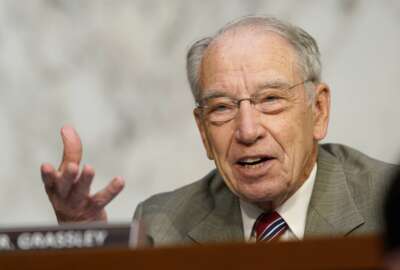The Federal Headlines is a daily compilation of the stories you hear discussed on Federal Drive with Tom Temin.
The acting deputy assistant secretary of defense for civilian personnel policy announces changes to how long anyone hired after November 2015 will have to work under the initial probationary period.
- New Defense Department hires will have to wait longer before they are off probation. A new policy changes the probationary period for civilian employees hired after November 2015 from one year to two years. The change is part of the 2016 defense authorization act, but the policy was not officially changed until the end of September. (Defense Department)
- After making some changes, the Defense Department has finalized its rule requiring DoD contractors and subcontractors to report cyber incidents which could adversely affect their information systems and covered defense information, or hinder its ability to provide operationally critical support. The rule takes effect Nov. 3. (Federal Register)
- The Air Force has said it’s creating a new position of chief information security officer — the first of several steps it plans to unveil during Cybersecurity Awareness Month. The Air Force said the stand-up of the CISO office is emblematic of the fact that a single month of awareness no longer cuts it when it comes to cybersecurity. Without releasing many other details, the service said Monday the new organization would develop an “enterprise approach” to securing its systems. The creation of a CISO was one of the recommendations of a task force the Air Force launched a year ago — officials said they’ll follow up with a messaging campaign meant to build more cybersecurity into the Air Force’s culture.
- Now 21 states are taking up the Homeland Security Department’s offer to give them cybersecurity training ahead of the November election. House and Senate leadership wrote to the National Association of State Election Directors last month, urging them to ask DHS for help in applying best practices to state and local election systems. Secretary Jeh Johnson echoes Congress’ call to action. He’s reminding state election officials they should directly ask DHS for help. (Department of Homeland Security)
- The Agriculture Department grows its workforce and relationship with veterans. USDA launched a national apprenticeship program this week for veterans looking for post-service jobs. The programs trains veterans to become quality graders and inspectors for foods and plants. USDA currently employs about 11,000 veterans. (U.S. Department of Agriculture)
- The Veterans Affairs Department missed the deadline to give the House VA Committee all documents related to Denver hospital construction project and spending on artwork for the past six years. The committee subpoenaed the VA last month. House VA Committee Chairman Jeff Miller (R-Fla.) said the department only turned in 18 of the 71 documents by the Sept. 28 deadline. The VA said it will submit the rest on a rolling basis. Miller wrote to VA Secretary Bob McDonald criticizing the effort so far. He’s also unhappy that some parts of the VA’s interview transcripts are redacted. (House Veterans Affairs Committee)
- An app to educate new political appointees is coming. The Government Accountability Office plans on giving new administration officials as well as members of Congress help in understanding the ongoing challenges each agency faces. GAO is developing a new app for lawmakers and new agency leaders to help distill into understandable chunks the more than 1,000 annual reports, of which 85 percent include recommendations. The new app will be available two days after the election. It will let users search the top priorities by agency or by topic, such as IT or improper payments. (Federal News Radio)
- Over half a million dollars was spent using charge cards from Housing and Urban Development’s travel card program without documents showing what the purchases were for. The agency’s inspector general identified over 3,500 cases of cardholders using travel cards, without an approved temporary duty station travel document. It’s recommending HUD go back and review the transactions. The IG also said it should establish a periodic review of the official cardholders and step up enforcement of the rules and requirements surrounding charge card use. (Housing and Urban Development Office of Inspector General)
- Attorney General Loretta Lynch announces a $119 million grant through the Justice Department’s Office of Community Oriented Policing Services to hire more officers across the country. The funds head to nearly 200 law enforcement agencies with a goal of creating or protecting 900 positions. (Department of Justice)
Copyright
© 2024 Federal News Network. All rights reserved. This website is not intended for users located within the European Economic Area.





